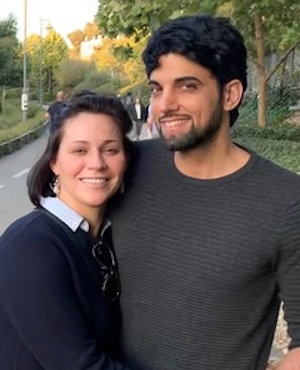 Iran’s Attack on Israel
Iran’s Attack on Israel


7 min read
Becoming Jewish is a wonderful journey, but it isn’t always easy.
Early last summer, I visited Israel and tucked a prayer into the Western Wall. It had been at least ten years since I’d made any serious attempt at prayer, but I was at a point in my life where the decisions I was making were not yielding the results I was looking for. I wanted to break the patterns that I learned in a difficult and abusive childhood, but I seemed unable to do so. I had already been married once to someone who treated me terribly; my boyfriends before and after usually weren’t any better. Wading through the quagmire of online dating was exhausting and depressing.
So I found myself divorced at 28 years old, standing in front of the Western Wall with a folded-up receipt from an Israeli gas station with just two words written on it: Husband, baby. I figured if there was power in prayer, it was to be found in the yearning of the heart and not so much in the power of the pen, so I kept it simple and tucked it into a crevice. I had rarely experienced such a longing, nor such a willingness to make the changes I needed to make to get where I wanted to go.
That night, I swiped right on a tall, good-looking Mizrahi man who is now my fiancé. It sounds like a love story from a novel, and in many ways it feels like it is (a lightning strike of luck, a handsome foreigner), but it is also challenging and complicated.
The least of the complications was the fact that I would have to convert to Judaism. In theory, this was no problem – I had seriously considered it before, because I had spent several years nannying for an observant Orthodox family and loved what I learned from them – but in practice it meant moving, changing jobs, and making all the lifestyle changes that go along with being an Orthodox Jew.
Gradually integrating the mitzvot into my life has provided structure and meaning that sustains me on difficult days and uplifts me further on good ones.
In many ways, transitioning into a Jewish lifestyle feels easy and familiar. I was raised a devout Mormon, so although I left that church in high school, I was intimately familiar with the "Old Testament" and found Jewish values to be already ingrained deep within me. I love the rich intellectual tradition of Judaism and find Jewish history and Judaism’s prominent figures, like Rabbi Akiva and Maimonides, fascinating. Gradually integrating the mitzvot into my life has provided structure and meaning that sustains me on difficult days and uplifts me further on good ones.

So far, so good. But in March, things got a little more complicated. I created a Twitter account to connect with other writers and advocate my own writing, and I began to publish more of my own tweets and get involved in others’ conversations. Many of these were positive about Israel, and many of them covered the Israeli-Palestinian conflict.
Before Twitter, my experience with anti-Semitism had been anecdotal: The shooting in Pittsburgh, the increasing reports of anti-Semitism, were sad and alarming but they all still felt somewhat remote. Then, within one week on Twitter, I was called a liar, white supremacist, Hasbara agent, dumb Jew, lying Jew, and a Nazi, among other names which are not fit to print. Someone threatened to dox me and publish my address so I could get the “punishment” I deserved.
Of course, it didn’t matter that I was not actually Jewish yet, nor that I had never even heard of Hasbara until someone accused me of working for them. It was made very clear that merely associating with Jews, or advocating for Israel, was enough to provoke the most inhuman rhetoric. For the most part, I took this in stride. It bothered me, but I wasn’t surprised by it.
Then one morning I met the limits of my ability to distance myself. It was the day after Amit Ben Yigal, a 21-year-old IDF soldier, was killed by a large rock dropped directly on his face from the roof of a Palestinian home. “What a price I have paid,” Amit’s father told reporters of the loss of his only son. I read that over and over again: What a price I have paid.
The seriousness with which I take a child’s life – indeed, the sacredness which Judaism attributes to every human life – makes me grieve when I see that a Palestinian child has been killed. I didn't know what I expected the reaction in the Twitterverse to Ben Yigal’s death to be, but it certainly wasn’t what I saw: Dozens of people earnestly rejoicing over his death in the most ugly and explicit terms. When I objected, they told me they hoped I, and every other Zionist Jew, would be next.
I’ve raised enough kids as a nanny and older sister to know that when you love a child, the thing you fear the most is the moment that occurs in the blink of an eye, a swift and irreversible tragedy. Now, I can tell you that it is also possible to lose sleep over the fear of the death of a child you don’t even have yet. My fiancé proudly served in the IDF and we will be proud to see our children serve as well, but it is impossible to consider their future service without knowing that what happened to Ben Yigal, what might happen any of the youth who fight for Israel, might also happen to us. Might happen to me.
Becoming a part of Judaism is one of the best decisions I’ve ever made, but it has forced me to confront real human ugliness and to take on responsibilities that I would rather not.
I went to a wonderful Jewish friend of mine and cried bitterly into her arms. She was very sympathetic, but she wasn’t shocked or horrified. It is unfortunate, she said, but if you want to be a Jew, this is just one of the perks of membership. As usual, she was right. We finished talking, and she gave me a warm hug, advised me to be brave, and buttressed me with a big bowl of homemade matzoh ball soup. Still blowing my nose, I sat at the table with her kids and the mood shifted quickly from sadness to silliness.
Becoming a part of Judaism is one of the best decisions I’ve ever made, but it has forced me to confront real human ugliness and to take on responsibilities that I would rather not. It is simultaneously one of the most joyous processes, and also one of the most sobering. As I move deeper into my own practice, and realize more about what it means to really take on the mantel of Judaism, I am having to learn an old Jewish tradition – that of holding gladness in one hand and grief in the other. It’s a hard lesson to learn, but I’ve never doubted my decision for a moment.
Indeed, having such behavior directed at me made me realize it had always been there, and that it always would be there, directed at people I love. How could I do anything else but stand beside them? After all, as I’m finding out, being part of a community is one of the most beautiful parts of Judaism; no matter what happens, you aren’t Jewish alone.
